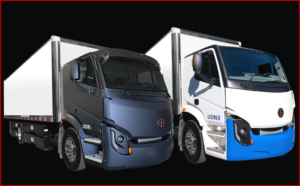
Cleaner, and likely much quieter.
The California Air Resources Board (CARB) said today that it is about to start a new pilot program that aims to help small trucking fleets make the transition to zero-emission trucks. The so-called Innovative Small e-Fleet pilot will focus on privately owned and non-profit trucking fleets with 20 or fewer trucks and less than $15 million in annual revenue.
The pilot will provide $25 million to implement a range of entries to help small fleets make the transition to zero-emissions. These will include flexible financing, short-term rentals, and full-service leases, such as all-inclusive truck-as-a-service options with enhanced incentives and fueling support. The pilot is contained within the larger Hybrid and Zero-Emission Truck and Bus Voucher Incentive Project (HVIP).
“Small fleets and owner-operators have often faced multiple barriers to zero-emission truck adoption, such as high upfront costs, limited financing, and complex planning for charging. By dedicating this set-aside funding for small fleets, HVIP can position itself to better understand the specific needs of this traditionally under-served group and support their transition to zero-emission ahead of the upcoming Advanced Clean Fleets rule,” CARB said.
AutoInformed on

About Ken Zino
Ken Zino, editor and publisher of AutoInformed, is a versatile auto industry participant with global experience spanning decades in print and broadcast journalism, as well as social media. He has automobile testing, marketing, public relations and communications experience. He is past president of The International Motor Press Assn, the Detroit Press Club, founding member and first President of the Automotive Press Assn. He is a member of APA, IMPA and the Midwest Automotive Press Assn.
He also brings an historical perspective while citing their contemporary relevance of the work of legendary auto writers such as Ken Purdy, Jim Dunne or Jerry Flint, or writers such as Red Smith, Mark Twain, Thomas Jefferson – all to bring perspective to a chaotic automotive universe.
Above all, decades after he first drove a car, Zino still revels in the sound of the exhaust as the throttle is blipped during a downshift and the driver’s rush that occurs when the entry, apex and exit points of a turn are smoothly and swiftly crossed. It’s the beginning of a perfect lap.
AutoInformed has an editorial philosophy that loves transportation machines of all kinds while promoting critical thinking about the future use of cars and trucks.
Zino builds AutoInformed from his background in automotive journalism starting at Hearst Publishing in New York City on Motor and MotorTech Magazines and car testing where he reviewed hundreds of vehicles in his decade-long stint as the Detroit Bureau Chief of Road & Track magazine. Zino has also worked in Europe, and Asia – now the largest automotive market in the world with China at its center.


CARB to Launch Small Fleet ZEV Conversion Incentives
Cleaner, and likely much quieter.
The California Air Resources Board (CARB) said today that it is about to start a new pilot program that aims to help small trucking fleets make the transition to zero-emission trucks. The so-called Innovative Small e-Fleet pilot will focus on privately owned and non-profit trucking fleets with 20 or fewer trucks and less than $15 million in annual revenue.
The pilot will provide $25 million to implement a range of entries to help small fleets make the transition to zero-emissions. These will include flexible financing, short-term rentals, and full-service leases, such as all-inclusive truck-as-a-service options with enhanced incentives and fueling support. The pilot is contained within the larger Hybrid and Zero-Emission Truck and Bus Voucher Incentive Project (HVIP).
“Small fleets and owner-operators have often faced multiple barriers to zero-emission truck adoption, such as high upfront costs, limited financing, and complex planning for charging. By dedicating this set-aside funding for small fleets, HVIP can position itself to better understand the specific needs of this traditionally under-served group and support their transition to zero-emission ahead of the upcoming Advanced Clean Fleets rule,” CARB said.
AutoInformed on
About Ken Zino
Ken Zino, editor and publisher of AutoInformed, is a versatile auto industry participant with global experience spanning decades in print and broadcast journalism, as well as social media. He has automobile testing, marketing, public relations and communications experience. He is past president of The International Motor Press Assn, the Detroit Press Club, founding member and first President of the Automotive Press Assn. He is a member of APA, IMPA and the Midwest Automotive Press Assn. He also brings an historical perspective while citing their contemporary relevance of the work of legendary auto writers such as Ken Purdy, Jim Dunne or Jerry Flint, or writers such as Red Smith, Mark Twain, Thomas Jefferson – all to bring perspective to a chaotic automotive universe. Above all, decades after he first drove a car, Zino still revels in the sound of the exhaust as the throttle is blipped during a downshift and the driver’s rush that occurs when the entry, apex and exit points of a turn are smoothly and swiftly crossed. It’s the beginning of a perfect lap. AutoInformed has an editorial philosophy that loves transportation machines of all kinds while promoting critical thinking about the future use of cars and trucks. Zino builds AutoInformed from his background in automotive journalism starting at Hearst Publishing in New York City on Motor and MotorTech Magazines and car testing where he reviewed hundreds of vehicles in his decade-long stint as the Detroit Bureau Chief of Road & Track magazine. Zino has also worked in Europe, and Asia – now the largest automotive market in the world with China at its center.